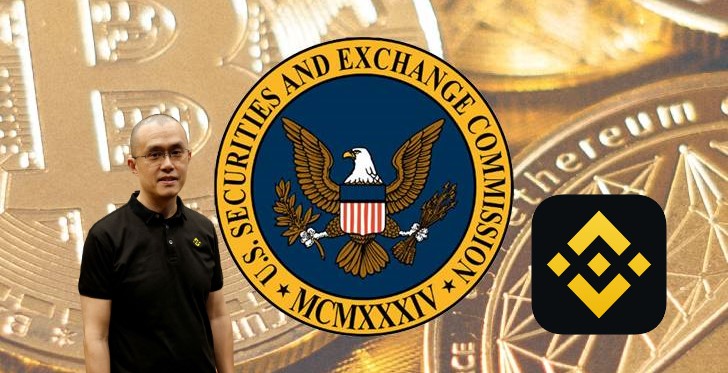
Binance Faces SEC Lawsuit: Unpacking the Allegations and Implications for the Crypto Industry
"US SEC accuses Binance and CEO Changpeng Zhao of multiple securities law violations
Binance Holdings Ltd., the world's largest cryptocurrency exchange, along with its chief executive officer Changpeng Zhao, have been brought to task by the US Securities and Exchange Commission (SEC). This legal action reflects the continual tightening of regulatory scrutiny on the nascent and volatile cryptocurrency market. The complaint lodged in a US federal court in Washington reveals an array of alleged violations committed by Binance and its head.
The 136-page dossier compiled by the SEC paints a detailed picture of the alleged flouting of investor protection rules that Zhao and Binance perpetrated over the years. The accusations add to the growing list of legal woes that the exchange and its CEO currently face. With a total of thirteen charges levelled against them, the SEC suggests that Binance and Zhao were engaged in a systematic web of deception, harboring conflicts of interest, neglecting disclosure, and intentionally evading the law.
SEC Chair Gary Gensler was vocal about his concern, warning the public against investing their hard-earned assets with or on such unlawfully operating platforms. However, Binance has categorically disputed the complaint, expressing disappointment and defending their previous efforts to engage with the SEC in good-faith negotiations to settle the matter. The firm insists that the SEC was misguided, given the lack of clarity over rules for digital assets. They continue to emphasize their intention to defend their platform vigorously.
Central to the SEC's claims is the accusation that two tokens linked to Binance, BNB and BUSD, were securities that the firm improperly offered and sold. Furthermore, the SEC alleges that the relationship between Binance and its US affiliate wasn't actually independent, suggesting that they were functioning improperly as an exchange, broker-dealer, and clearing agency without registering with the agency. The SEC has alleged that behind the public façade of Binance.US being an independent trading platform, Zhao and Binance were in control of the platform's operations.
This case isn't an isolated incident. It echoes a lawsuit filed earlier this year in March by the US derivatives watchdog, the Commodity Futures Trading Commission (CFTC), alleging similar rule-breaking by Binance and Zhao. This back-to-back regulatory action hints at a broader effort to regulate the often murky operations of cryptocurrency exchanges.
One particularly striking accusation was the alleged engagement in manipulative trading, or "wash trading," by Sigma Chain, a trading firm owned and controlled by Zhao. According to the SEC, Sigma Chain used this technique to artificially inflate Binance.US's trading volume from September 2019 until June 2022. It's an allegation that, if proven true, could potentially damage the reputation and trust of investors in the platform.
Adding fuel to the fire, the SEC also accused Binance of improperly handling customer funds. Billions of dollars were reportedly funnelled into an account belonging to an entity called Merit Peak Limited, which was controlled by Zhao. Funds from that entity were then reportedly transferred to a third party and appeared to be used to buy and sell cryptocurrencies.
In another allegation, the SEC claimed that by 2021, at least $145 million was transferred from Binance.US to a Sigma Chain account. An additional $45 million was deposited into the account from a Nevada-based trust company connected to the US platform. The SEC further alleged that Sigma Chain used $11 million from the account to purchase a yacht.
This case brings to light serious concerns over Binance's practices. These issues span a wide spectrum from the mishandling of customer funds to the operation of unregulated international exchanges, evading regulatory oversight, and alleged violations of securities laws. The recent backlash and legal actions against Binance and its billionaire founder Changpeng Zhao reflect a larger push by regulators to assert control over cryptocurrency exchanges and the broader digital asset marketplace.
Interestingly, Binance has previously claimed it made efforts to operate legally in the US by creating a separate entity, Binance.US, to comply with regulations. This, however, did not stop the SEC's allegations of unlawful activities.
At the heart of the issue is a persisting regulatory ambiguity regarding digital currencies, particularly over whether certain tokens are commodities or securities. As such, they would fall under the respective regulatory purview of the CFTC and the SEC.
These allegations against Binance and Zhao are part of a broader wave of enforcement actions against crypto firms and individuals. As legal battles like these shape the landscape for cryptocurrencies, Binance maintains its plea for a clear and practical regulatory framework. They argue that unclear or burdensome regulations would harm investors and stifle innovation in the digital asset space. As these cases unfold, they will undoubtedly have significant implications for the regulation and public perception of cryptocurrencies both in the US and globally.
Read More
-
COPX ETF Price At $73.75: Copper Miners Surge On Record Copper And AI Demand
25.12.2025 · TradingNEWS ArchiveStocks
-
XRP ETF Assets Break $1.25B as XRP-USD Holds $1.87 in a Tight $1.85–$1.91 Range
25.12.2025 · TradingNEWS ArchiveCrypto
-
Natural Gas Price Forecast: NG=F Near $4.25 After $4.59 Spike as LNG Flows and Winter Cold Collide
25.12.2025 · TradingNEWS ArchiveCommodities
-
USD/JPY Price Forecast - USDJPY=X At 156: Can The 160 Line Hold Before A Drop Toward 140?
25.12.2025 · TradingNEWS ArchiveForex

















